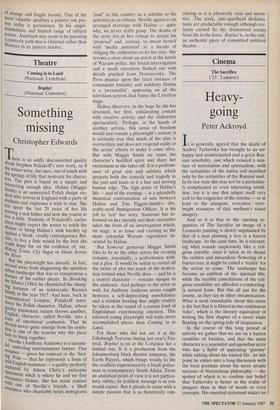Theatre
Coming in to Land (National: Lyttelton) Bopha: (National: Cottesloe)
Something missing
Christopher Edwards
There is an oddly disconnected quality about Stephen Poliakoffs new work, as if the writer were, for once, out of touch with the springs of life that motivate his charac- ters. The plot is based on a simple and interesting enough idea. Halina (Maggie Smith) is an unmarried Polish design stu- dent who arrives in England with a party of students and expresses a wish to stay. She has spent the last 29 years of her life nursing a sick father and now she yearns to live a little. Students of Poliakoff's earlier Plays might expect the writer to relish the chance to bring Halina's wish harshly up against a bleak, vividly contemporary Bri- tain; to live a little would be the best she could hope for on the evidence of, say, 'tang Town, City Sugar or Shout Across the River. ' But the playwright has already, in .fact, moved away from diagnosing the spiritless urban landscape that was so conspicuous a feature of his earlier pieces. In Breaking he Silence (1984) he chronicled the chang- ing fortunes of an aristocratic Russian family in the year 1917. And here, back in eontemporary London, Poliakoff intro- duces his Polish character, Halina, whose quirky passionate nature throws another, English, character, called Neville, into a state of emotional confusion. That he snould never quite emerge from his confu- fo d .n is one of the reasons why this piece
s o hang together.
Neville (Anthony Andrews) is a success- wl, unfeeling entertainment lawyer. One sti, Ines — given his contrast to the 'feel- s' — that he represents a form of arid English maleness — a quality perfectly captured by Alison Chitty's antiseptic aPartment whch is where he and we first encounter Halina. She has made contact with one of Neville's friends, a Shell executive who charitably helps immigrants
'land' in this country as a sideline to his activities as an oilman. Neville agrees to an arranged marriage with Halina — quite why, we never really grasp. The drama of the story lies,in her refusal to accept his 'proposal' and, instead, to invest herself with 'media . potential' as a means of obliging the authorities to let her stay. She invents a story about an arrest at the hands of Warsaw police, her brutal interrogation and a mock execution fleshed out with details pinched from Dostoyevsky. The Press pounce upon this latest instance of communist brutality and suddenly Halina is a 'personality', appearing on all the television screens that frame the Lyttelton stage. Halina discovers, in the huge lie she has invented, her first, exhilarating contact with creative activity and she elaborates spectacularly. Perhaps, in the hands of another actress, this sense of freedom would just remain a playwright's notion; it is certainly true that much of the play is overwritten and does not respond easily to the actors' efforts to make it come alive. But with Maggie Smith we sense the character's huddled spirit and share her excitement as she takes off. It is a perform- ance of great zest and subtlety which projects both the comedy and tragedy in the part and lends to it a fine and moving human edge. The high point of Halina's life — and of the evening — is a splendidly theatrical confrontation of wits between Halina and Tim Piggott-Smith's dry, crafty-eyed Immigration Officer. It, is his job to 'test' her story. Someone has in- formed on her already and their encounter takes the form of an interrogation which, on stage, is as tense and exciting as the more colourful Warsaw experience in- vented by Halina.
But however generous Maggie Smith tries to be to the other actors the evening remains, essentially, a performance with- out a play. It would be unfair to reveal all the twists of plot but much of the motiva- tion behind what Neville does — and he is a central character — remains opaque to the audience. And perhaps to the actor as well, for Anthony Andrews seems caught between a self-deprecating nonchalance and a strident bawling that might crudely be taken as the sound of a certain kind of Englishman experiencing emotion. This talented young playwright will write more accomplished pieces than Coming in to Land.
For those who did not see it at the Edinburgh Traverse during last year's Fes- tival, Bopha! is on at the Cottesloe for a limited run. It is a production from the Johannesburg black theatre company, the Earth Players, which brings vividly to life the conflicts experienced by a black police- man in contemporary South Africa. From an analytical point of view it is not particu- larly subtle; its political message is as you would expect. But it pleads its cause with a simple passion that is as theatrically con- vincing as it is physically vital and inven- tive. The stark, anti-apartheid declama- tions are predictable enough although cer- tainly earned by the dramatised scenes from life in the force. Bopha! is, in the end, an authentic piece of committed political theatre.










































 Previous page
Previous page